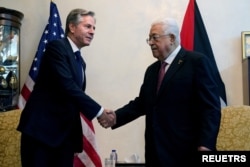LATEST DEVELOPMENTS:
- Hamas tells civilians to ignore an Israeli Defense Forces call for 1.1 million civilians to evacuate to northern Gaza for southern areas within 24 hours “for their own safety.
- The militant group also says Israeli airstrikes in the past 24 hours have killed 13 Israeli and foreign hostages.
- U.S. Secretary of State Antony Blinken meets with Jordanian King Abdullah and Palestinian Authority President Mahmoud Abbas in Jordan.
- Defense Secretary Lloyd Austin meets with senior government leaders in Israel.
- U.N. says 340,000 people displaced in Gaza.
- Israel says 1,800 killed in Hamas raid; Gaza says 1,500 killed in retaliatory strikes.
Palestinians living in the northern Gaza Strip scrambled Friday as the clock ticked down on an Israeli order to evacuate to the southern part of the Strip within 24 hours ahead of what many fear will be a major Israeli ground offensive into the Hamas-controlled territory.
The Israel Defense Forces confirmed early Friday that it had notified residents in Gaza City to leave for “their own safety and protection.”
“You will be able to return to Gaza City only when another announcement permitting it is made,” IDF spokesman Jonathan Conricus said in a livestreamed briefing on the social media platform X. “Do not approach the area of the security fence with the state of Israel.”
Hamas, however, has called for everyone to “remain steadfast in your homes and to stand firm in the face of this disgusting psychological war waged by the occupation,” according to the Associated Press.
Palestinian U.N. Ambassador Riyad Mansour told reporters Friday that Israel’s evacuation order amounts to “ethnic cleansing” of hundreds of thousands of Palestinians who have nowhere to flee.
“We don’t know what’s happening at this moment in the northern part of Gaza where the Israeli occupying forces told people to evacuate — people don’t know where to go,” Mansour told reporters ahead of a meeting with Arab ambassadors. “There is no safe place in the Gaza Strip.”
United Nations spokesman Stephane Dujarric said late Thursday in New York that the evacuation order applies to about 1.1 million people and is impossible to carry out “without devastating humanitarian consequences.” He urged Israel to rescind the order.
Israel put Gaza under a “complete siege” on Monday, saying it was acting in response to Saturday’s deadly Hamas attacks, which killed more than 1,300 Israelis.
Palestinians are currently without electricity, water and fuel, making a mass evacuation even more risky and complex.
‘Chaos’
“This is chaos, no one understands what to do,” Inas Hamdan, an officer at the United Nations’ Palestinian refugee agency in Gaza City, told the AP, adding that U.N. staff are evacuating northern Gaza.
The U.N.’s Dujarric said the order also applies to all U.N. staff and those sheltering in U.N. facilities — including schools, health centers and clinics.
The U.N. agency that assists Palestinian refugees, UNRWA, says it has relocated its central operations center and its international staff of about 300 to a location in southern Gaza to continue its humanitarian work. UNRWA has about 13,000 staff in Gaza; the overwhelming majority are Palestinian.
“They are U.N. facilities. They must be protected at all times and must never come under attack in accordance with international humanitarian law,” UNRWA said in a statement.
The World Health Organization warned that it is impossible to evacuate hospital patients – many of them children and severely ill or injured people on life support machines – from northern Gaza.

Palestinian children wounded in Israeli strikes wait for treatment in Shifa Hospital in Gaza City, Oct. 13, 2023.
“Moving those people is a death sentence,” said WHO’s Tarik Jasarevic.
An ongoing campaign of Israeli airstrikes that began hours after Saturday’s Hamas incursion has killed at least 1,500 people in Gaza. Israel says it has dropped 6,000 bombs over six days of bombardment.
“The numbers of casualties are increasing every hour,” Bashar Murad, director of the humanitarian group the Palestinian Red Crescent, told Alhurra, an Arabic language satellite TV sister organization of the Voice of America. “The number of dead and injured that arrived to the hospitals is much more than the capacity of these hospitals.”
The United Nations said nearly 340,000 Palestinians have been displaced from their homes in Gaza, with more than two-thirds of them taking shelter in U.N. schools. It launched a humanitarian appeal Thursday for $294 million to meet immediate needs in Gaza and the West Bank.
The U.N. Security Council will hold a closed-door meeting to discuss developments later Friday.
Military buildup
Israel has positioned 300,000 reservists near the border with Gaza but has said no decision has been made on moving forward with an offensive. In the meantime, it continues heavy bombardment of Gaza, vowing there will be no letup until Hamas releases the estimated 150 hostages they are holding.
Israeli and Lebanese media reported clashes along their mutual border Friday.

Smoke rises after Israeli shelling, as seen from Lebanese side near the border with Israel in Alma Al-Shaab, southern Lebanon, Oct. 13, 2023.
On Thursday, Human Rights Watch claimed that Israel used white phosphorus in military operations in Gaza on Wednesday in what constitutes a violation of international humanitarian law. White phosphorus can cause severe burns and long-term health issues.
“There was no use of white phosphorus in the Gaza Strip. Period,” IDF spokesman Lieutenant Colonel Amnon Sheffler told reporters Thursday.
Meanwhile, the Committee to Protect Journalists has documented at least seven journalists killed in Gaza since Saturday.
Blinken and Austin in region
The United States has said that 27 Americans were killed in the terror attack and 14 are missing.
U.S. Secretary of State Antony Blinken on Friday met with Jordan’s King Abdullah in Amman, a day after holding talks with Prime Minister Benjamin Netanyahu in Israel.

U.S. Secretary of State Antony Blinken shake hands with Palestinian President Mahmoud Abbas, in Amman, Jordan, Oct. 13, 2023. (Jacquelyn Martin/Pool via Reuters)
In Amman he also met with Palestinian Authority President Mahmoud Abbas. The Palestinian leader has been reluctant to condemn the Hamas attacks despite no love between the two Palestinian factions but appeared to take a step in that direction Friday.
“We reject the practices of killing civilians or abusing them on both sides because they contravene morals, religion and international law,” the official Palestinian news agency, Wafa, quoted Abbas as saying according to Reuters.
From Jordan, Secretary of State Blinken traveled to Qatar Friday, where he urged Israel to safeguard civilians, but noted that Hamas was reportedly blocking roads and preventing Palestinian civilians from fleeing south.
“Now, efforts to get humanitarian aid into Gaza are complicated by the fact that Hamas continues to use innocent civilians as human shields,” Blinken said, “and is reportedly blocking roads to prevent Palestinians from moving to southern Gaza out of harm’s way.”
Blinken said leaders are working together to urgently rescue Israelis taken hostage by Hamas during its attack on Saturday. The top U.S. diplomat will also visit Bahrain and Saudi Arabia as well as Egypt. This is his largest tour of the region since taking office in January 2021.
At the White House Friday, officials said President Joe Biden took part in a call that included family members of the 14 Americans still unaccounted for following the Hamas attack.
And U.S. Defense Secretary Lloyd Austin arrived in Israel Friday for meetings with senior government leaders and to see firsthand some of the U.S. weapons and security assistance that Washington rapidly delivered to Israel in the aftermath of Hamas’s attacks.
“This is no time for neutrality, or for false equivalents, or for excuses for the inexcusable. There is never any justification for terrorism, and that’s especially true after this rampage by Hamas,” Austin told reporters in Tel Aviv.

Israelis take cover as a siren sounds a warning of incoming rockets fired from the Gaza Strip in Rehovot, Israel, Oct. 13, 2023.
He stressed that Israel has a right to defend itself, adding that his experience working with the Israeli military while he was the general in charge of U.S. military operations in the Middle East leaves him confident, they are and will remain “professional” and “focused on the right things.”
“Terrorists like Hamas deliberately target civilians, but democracies don’t. This is a time for resolve and not revenge, for purpose and not panic, and for security and not surrender,” Austin added.
After meeting with the Israeli War Cabinet, Austin traveled to Nevatim Air Base, where U.S. security assistance continued to arrive Friday.
The defense secretary said that aid included munitions, air defense capabilities such as more interceptors for the Israel’s Iron Dome, along with other equipment and resources.
“The U.S. is the most powerful country in the world … so we will stand with Israel even as we stand with Ukraine,” Austin said.
VOA White House Correspondent Anita Powell, United Nations Correspondent Margaret Besheer and Pentagon Correspondent Carla Babb contributed to this report. Some information for this article came from The Associated Press, Agence France-Presse and Reuters.
